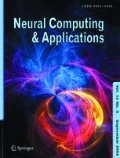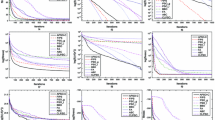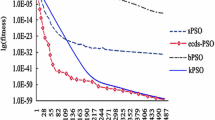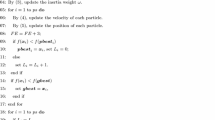Abstract
An algorithm proposed using Renyi entropy clustering to improve the searching ability of traditional particle swarm optimization (PSO) is introduced in this study. Modified PSO consists of two steps. In the first step, particles in initial population are sorted according to Renyi entropy clustering method, and in the second step, some particles are removed from population and some new particles are added instead of them based on the sorted list. Thus, a reliable new initial population is created. When using sorted list from first to last with decreasing inertia weight parameter, or from last to first with increasing inertia weight parameter, a little improved search performances have been observed on three commonly used benchmark functions. However, in other two combinations of the proposed algorithm (from last to first with decreasing inertia weight and from first to last with increasing inertia weight), little worse optimization performances than traditional PSO have been noted. These four types of the proposed algorithm were run with different exchanging rate values. Thus, the representation ability of Renyi entropy clustering on initial population and the effect of organizing inertia weight parameter were evaluated together. Experimental results which were surveyed at different exchanging rate values showed the efficiency of such evaluation.





Similar content being viewed by others
References
Alatas B, Akin E, Ozer AB (2009) Chaos embedded particle swarm optimization algorithms. Chaos, Solitons Fractals 40:1715–1734
De Jong K (1975) An analysis of the behaviour of a class of genetic adaptive systems. PhD thesis, University of Michigan
Gokcay E, Principe I (2002) Information theoretic clustering. IEEE Trans Pattern Anal Mach Intell 24(2):158–170
Griewangk AO (1981) Generalized descent of global optimization. J Optim Theory Appl 34:11–39
Hassan R, Cohanim B, de Weck O, Venter G (2005) A comparison of particle swarm optimization and the genetic algorithm. In: 1st AIAA multidisciplinary design optimization specialist conference, No. AIAA-2005-1897, Austin, TX
Jenssen R, Hild KE, Erdogmus D, Principe JC, Eltoft T (2003) Clustering using Renyi’s entropy. In: Proceeding of international joint conference on neural networks, Portland, USA, July 20–24, pp 523–528
Jiao B, Lian Z, Gu X (2008) A dynamic inertia weight particle swarm optimization algorithm. Chaos, Solitons Fractals 37(3):698–705
Jiao B, Lian Z, Chen Q (2009) A dynamic global and local combined particle swarm optimization algorithm. Chaos, Solitons Fractals 42(5):2688–2695
Kennedy J, Eberhart RC (1995) Particle swarm optimization. In: Proceedings of the IEEE conference on neural networks, Perth, Australia, pp 1942–1948
Parzen E (1962) On the estimation of a probability density function and the mode. Ann Math Stat 32:1065–1076
Principe J, Xu D, Fisher J (2000) Unsupervised adaptive filtering. In: Haykin S (ed) Information theoretic learning, vol 1, chapter 7. Wiley
Rastrigin LA (1974) External control systems. In: Theoretical foundations of engineering cybernetics series. Nauka, Moscow, Russia
Renyi A (1960) On Measures of entropy and information. In: Fourth Berkeley symposium on mathematical statistics and probability, pp 547–561
Shi Y, Eberhart RC (2001) Fuzzy adaptive particle swarm optimization. In: Proceedings of the 2001 congress on evolutionary computation, vol 1, pp 101–106
Shi Y, Liu H, Gao L, Zhang G (2011) Cellular particle swarm optimization. Inf Sci 181:4460–4493
Van den Bergh F (2001) An analysis of particle swarm optimizers. Doctoral Thesis, University of Pretoria
Yang X, Yuan J, Ji Yuan, Mao H (2007) A modified particle swarm optimizer with dynamic adaptation. Appl Math Comput 2007(189):1205–1213
Zheng YL, Ma LH, Zhang LY, Qian JX (2003a) On the convergence analysis and parameter selection in particle swarm optimization. In: Proceedings of the IEEE international conference on machine learning and cybernetics. IEEE Press, Piscataway, pp 1802–1807
Zheng YL, Ma LH, Zhang LY, Qian JX (2003b) Empirical study of particle swarm optimizer with an increasing inertia weight. In: Proceedings of the 2003 IEEE congress on evolutionary computation. IEEE Press, Piscataway, pp 221–226
Acknowledgments
This work is supported by Pamukkale University Scientific Research and Projects Unit (Grant No. 2011BSP015).
Author information
Authors and Affiliations
Corresponding author
Rights and permissions
About this article
Cite this article
Çomak, E. A modified particle swarm optimization algorithm using Renyi entropy-based clustering. Neural Comput & Applic 27, 1381–1390 (2016). https://doi.org/10.1007/s00521-015-1941-9
Received:
Accepted:
Published:
Issue Date:
DOI: https://doi.org/10.1007/s00521-015-1941-9




